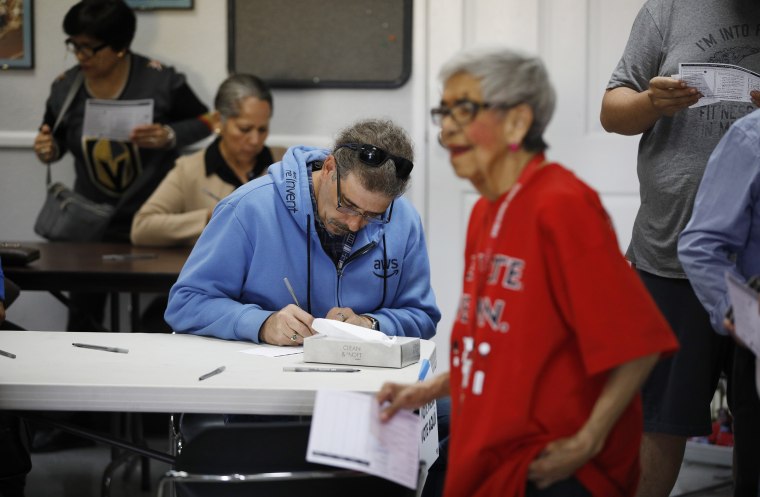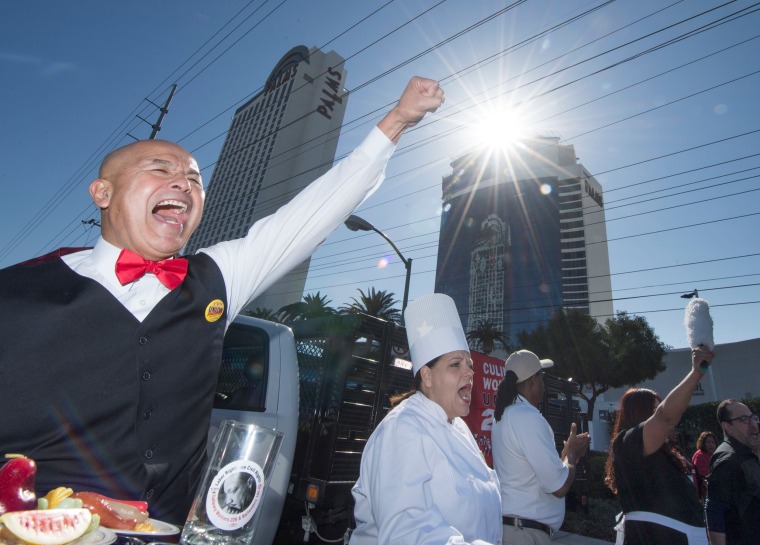LAS VEGAS — As Bernie Sanders' national polling lead grows, Democratic rivals have sought todrive a wedge between him and the people he says his campaign is all about — all in the hopes of peeling off support from members of Nevada's politically powerful unions in Saturday's caucuses.
"You're not the only one who cares about the working class," Pete Buttigieg told Sanders during the debate here Wednesday night. “You're the one who is at war with the Culinary Union right here in Las Vegas.”
On a night that featured sharp elbows thrown in every direction, that particular jab was intended to cut deep. The Vermont senator's candidacy is rooted in pro-worker policies and the power of collective bargaining, and he's joined union members on picket lines for decades. But in his pursuit of a political revolution — one centered around "Medicare for All" and the belief that health care is a human right — whether those unions support his campaign is less of a given.
In a still-fluid race where margins of victory have so far been razor-thin, Sanders' competition has tapped into anxieties that union members have expressed about the prospect of giving up the generous health care plans they have fought for on those very picket lines.
“Our health care is very important to us. A lot of people don’t understand why our health care is important to us. It’s because they’ve never had it,” Jacob George, 37, a cook at the MGM Grand here and a member of the influential Culinary Workers Union Local 226, told NBC News this week at the union hall where he was about to cast his ballot through early voting. “Our health care covers everything that we have, everything that you could possibly have. We don’t need a supplemental insurance for it, and we don’t have to pay a monthly fee for it.”
Also at the union hall, Juston Larsen, 24, a Starbucks barista who said he had asthma and anxiety, said he would be “voting for whoever is going to protect my health care.”
Cynthia Kerekes, 62, a server at the Cosmopolitan hotel, said she likes Sanders and Elizabeth Warren but not Medicare for All.
“It's just that issue,” she said.
Nevada has several large, diverse and powerful unions, which can help mobilize the legions of cooks, housekeepers and others who work in Las Vegas' hotels and casinos. In 2008, they helped boost then-Sen. Barack Obama in the Democratic primary against Hillary Clinton.
But infighting over which candidate to back could undermine that clout and pit rank-and-file members against leadership — something best avoided in a primary contest, strategists said, even when tensions with campaigns boil over into public view.
Last week, a public spat erupted between Sanders supporters and Culinary Workers after a flier circulated warning members that Medicare for All would "end Culinary health care." The union later said they were “viciously attacked” by Sanders’ supporters for it, prompting Sanders to profess his support for the union and speaking out against any harassment done in his name. Union leadership then held a press conference to announce it wasn't going to endorse any candidate in the primary.
“You’ve got very divided support among the membership — not just by state but by city and county but within families, for a whole host of reasons," said Eddie Vale, a Democratic strategist who works with unions. "So if membership is happy with lots of different options, there’s no reason to go all in with one candidate.”
And Sander's rivals — keen on slowing him down in the lead-up to Super Tuesday on March 3, a night when more than 1,300 delegates are up for grabs — are stoking those fears.
During the debate, Sen. Amy Klobuchar warned that Sanders was threatening to take away health care plans that had been “negotiated over time, sweat and blood,” while Biden summed up his stance with a, “Hey, I'm the only one on this stage that actually got anything done on health care, OK?”
Polls show Sanders with a double-digit lead in Nevada and nationally, but Harry Reid, the longtime senator from Nevada and former Democratic leader who opposes Medicare for All, told NBC News that “a lot can change and will change.”
Larry Cohen, the former president of the Communications Workers of America who is now the board chair of the advocacy group Our Revolution, which spun out of Sanders’ 2016 bid, expressed frustration that candidates were using what he called "divide and conquer" techniques to split labor voters.
"They know better, and they’re just using it to get an edge," he said, claiming candidates who advocated for improving the existing system were intentionally misleading voters on the practical effects of the universal health care policy Sanders has proposed.

He said that if advocates offered specifics on how Medicare for All would, for example, make it easier to change jobs and keep people from losing coverage due to an injury or time off work, it would help calm the anxieties of union members.
“We’ve got to lead with, ‘This is exactly what we’re going to do,’” he told NBC News.
Sanders appears to be following that same playbook in recent weeks, talking up the tweak he made to his policy proposal last summer in allowing unions to negotiate wrap-around services to Medicare for All. He's also argued that unions could negotiate for better pay and other benefits with the bulk of health care off the table, while reminding supporters that he wants to make sure workers — not employers — would see health care savings in their paychecks.
“When you are in a union, your union negotiators will not have to spend half of their time trying to protect the health care benefits that you have. You can start talking about increasing wages and pensions and better working conditions,” Sanders said last week in a teleconference town hall with the League of United Latin American Citizens.
But for some unions, this isn't a fight they want to have right now.
“I think that we need to listen to what the Democrats candidates are saying about health care, but we can’t lose sight of the fact that the other side wants to tear" apart the Affordable Care Act, said Lee Saunders, president of the American Federation of State, County and Municipal Employees, which is part of the AFL-CIO. “It’s not worth having a major debate about how we get from point A to point B when everyone wants to move along — the other side wants to take us back to before A was in existence."
He said his union, which has 1.4 million members nationwide, isn't planning on endorsing anyone anytime soon.
"We don’t want to be given a false choice of, we’ve got to support single payer or Medicare for All or support incremental changes — all of those things should be put on the table," he told NBC News.
Still, they're encouraging voters to be active participants in the primary — particularly in the delegate process.
"Because there’s a possibility it could be brokered, we want to have a seat at the table," Saunders said, referring to the convention. "This year, we think it's very important that we have members running for delegate status."
Jane C. Timm reported from New York, and Caitlin Fichtel reported from Las Vegas.


